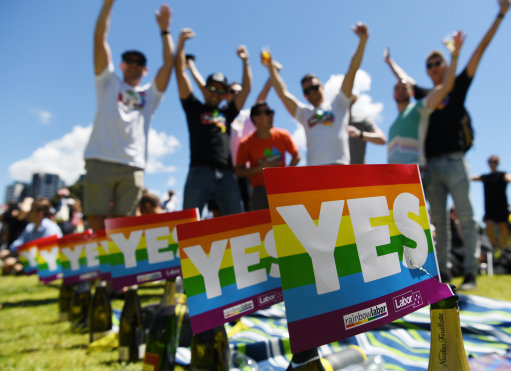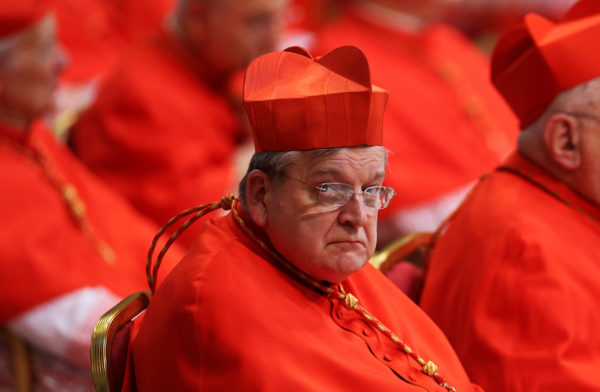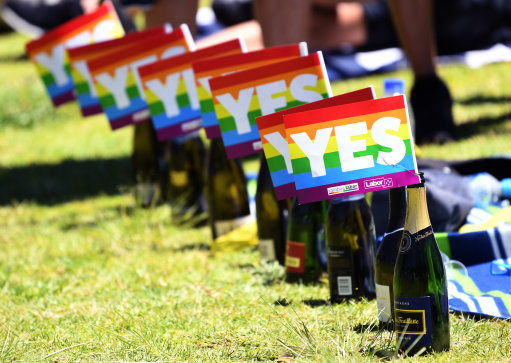MPs must acknowledge the concerns of more than 4.8 million Australians who opposed changing the definition of marriage by enacting strong protections for conscience and religious freedom, the President of the Australian Catholic Bishops Conference, Archbishop Denis Hart, said after more than 60 per cent of respondents in the national postal survey endorsed changing the law to allow same-sex marriage.
Melbourne's Archbishop Hart said the Australian Marriage Law Postal Survey result did not change the Catholic understanding of marriage.
"The Catholic Church, and many others who sought to retain the definition of marriage as it has been understood for centuries, continues to view marriage as a special union between a woman and a man, which allows for the creation and nurture of children," Archbishop Hart said.
"A change in civil law does not change the Catholic understanding of the nature of marriage.
"The Catholic Church continues to respect the dignity of LGBTIQ Australians and our ministries will continue to care deeply about the dignity and value of all people we encounter.
"Parliamentarians must recognise and respect the concerns of the more than 4.8 million Australians who opposed a change to the definition of marriage by putting in place strong conscience and religious freedom protections.
"These protections must ensure that Australians can continue to express their views on marriage, that faith-based schools can continue to teach the traditional understanding of marriage and that organisations can continue to operate in a manner that is consistent with those values."
The Australian Statistician, Mr David W. Kalisch, announced the result of the survey, conducted by the Australian Bureau of Statistics after attempts to conduct a plebiscite conducted by the Australian Electoral Commission failed to win parliamentary support, on 15 November.
All six states and two mainland territories recorded a majority "Yes" response, with 7.8 million people (61.6 per cent of eligible respondents) in favour and 4.8 million (38.4 per cent) responding "No". More than 12.7 million people out of 16 million eligible respondents - 79.5 per cent – participated in the voluntary survey in a country in which compulsory voting has been the norm for almost 100 years.
Of the 150 electorates (constituencies) in the House of Representatives, 133 recorded a majority "Yes". Only New South Wales, Australia's most populous state, failed to reach 60 per cent approval for the measure, largely due to the strong "No" vote in western Sydney – an area with a high number of non-English-speaking people of diverse religious and ethnic backgrounds. In a concerning result for the Opposition Labor Party, which favours same-sex marriage, the three western Sydney seats with the highest "No" votes are held by front bench MPs.
Archbishop Anthony Fisher of Sydney said he was both disappointed and heartened by the result of the survey.
"While I do not deny the good will of many who voted Yes, I am deeply disappointed that the likely result will be legislation to further deconstruct marriage and family in Australia," Archbishop Fisher said.
"But I am heartened that millions of Australians still stand by the conviction that marriage is a unique relationship between a man and woman. In fact, only 48% of eligible voters voted Yes to redefining marriage in law.
"To the many already-married couples and those contemplating it I say: don't let this decision dishearten you or undermine your appreciation of the sanctity of real marriage."
Archbishop Fisher said he wanted to acknowledge all those who had courageously spoken up for traditional marriage in very difficult circumstances.
"From the outset, it has often seemed a David and Goliath struggle with politicians, corporates, celebrities, journalists, professional and sporting organisations drowning out the voices of ordinary Australians and pressuring everyone to vote Yes. What's remarkable is how many stuck to their guns and voted No or abstained.
"I recognise that for some people this debate has been a cause of distress. It is time now to come together as a nation, renew our friendships with those who think differently to us, and ensure that respect for different beliefs is clearly enshrined in our laws and customs."
Archbishop Fisher said it was vital that new marriage legislation protects rights to religious belief and expression, free speech and association, in education and parenting.
"Polling data shows both yes and no voters support robust religious liberty protections," he said.
"Lame proposals to protect ministers of religion and places of worship offer no protection to the 99.9% of religious believers who are not clergy. It is imperative that our political leaders enact laws that protect the rights of all, religious believers included.
"As we create a legal 'right' to marry a person of the same sex, we must not trade off existing rights to religious belief and expression, and other freedoms. There is room in the Australian public square for both. Surely it is not beyond the wit and good will of our political leaders to progress both concerns."
Archbishop Julian Porteous of Hobart, who was referred to Tasmania's Anti-Discrimination Commissioner in 2015 for distributing a pastoral letter from Australia's bishops to Catholic schools defending the Church's teaching on marriage before the complaint against him was withdrawn last year, told Hobart's Mercury newspaper that Australians should be able to continue to express their views on marriage, faith-based schools should teach the traditional understanding of marriage and organisations should continue to operate according to their values.
“If there is a decision to change the legal definition of marriage, there are Australians — including many who voted ‘yes’ — who believe that freedom of conscience and religion need to be protected,” Archbishop Porteous said.
“These freedoms belong to all people, not just institutions or professional clergy.”
Fr Frank Brennan -- Jesuit, human rights advocate and supporter of a "Yes" vote with protections for religious believers -- told the Australian Broadcasting Corporation's Lateline program that he was relieved the survey was over, delighted that it produced a strong showing in greater numbers than the Irish, "but, like the Irish, was about 62 per cent in support, so a good clear result, and I think showing that as a society, no matter what our religious, cultural backgrounds... we want to give respect, endorsement to relationships..."
But Fr Brennan said Australia's "legal architecture" was deficient in protecting religion freedom. There was still no national provision allowing parents to determine what their children were taught and what they did not want them taught.
Sydney's Anglican Archbishop, Dr Glenn Davies, whose diocese donated $1 million to the "No" campaign, said he accepted the result, "although this won't prevent me from continuing to teach that marriage, in God's good design, is between a man and a woman - an exclusive and permanent union".
"But nonetheless, the reality will be, in a very short period of time, that our Parliament will legislate for same-sex marriage," Archbishop Davies said.
"We as Christians will continue to be strong in our belief of what God has given to us in His word. Our schools, our churches, our organisations will continue to reflect God's love in a world of diverse opinions -- holding firm to what God has taught us in His word but generously, compassionately and graciously engaging with Australia where matters are in dispute. Where people consider God's word is not the authority, we must continue to witness to that authority in the way in which Jesus would do so -- with love and grace but firmness and boldness and confidence in God's word for Australia today."
Prime Minister Malcolm Turnbull made a pledge "to get on with the job the Australian people have tasked us to do and get this done, this year, before Christmas". "That must be our commitment," he said.
"The Australian people... voted ‘yes’ for fairness. They voted ‘yes’ for commitment. They voted ‘yes’ for love...This was an unprecedented exercise in democracy."

PICTURE: People celebrate after watching the marriage vote result announcement during a picnic held by the Equality Campaign at Prince Regent Park in Sydney @PA
Earlier this week, campaigners on both sides of the debate said they will continue to be active regardless of the result.
The Coalition for Marriage, of which the Archdiocese of Sydney and its Anglican counterpart were leading partners in prosecuting the "mo" case, had declared it was committed to defending parents’ rights, freedom of speech and freedom of faith regardless of the result.
PICTURE: Rainbow Yes flags are pictured after the marriage vote result announcement during a picnic held by the Equality Campaign at Prince Alfred Park in Sydney, Wednesday, November 15, 2017
Wish to comment on this story? Join the debate on Facebook and follow on Twitter.



 Loading ...
Loading ...